International Staffing: Approaches, Globalisation and HRM Analysis
VerifiedAdded on 2022/09/12
|5
|1128
|26
Report
AI Summary
This report delves into the realm of international staffing, a critical component of international human resource management (IHRM). The paper begins by defining international staffing and its significance in the context of multinational firms and globalization. It emphasizes the importance of skilled human resources in determining an organization's success in foreign markets. The report then explores four primary approaches to international staffing: ethnocentric, polycentric, geocentric, and regiocentric, each with its unique implications for managerial appointments and HRM practices. It also highlights the impact of globalization on international staffing, including expatriation, cultural considerations, and the influence of both home and host countries. The report concludes by summarizing the key concepts and approaches discussed, underscoring the crucial role of international staffing in a company's global expansion. The report references key research from scholars such as Desai, Porter, Kang & Shen, Parízek, Torbiörn, Wood & Salt and Dixon & Knapp to support the claims.
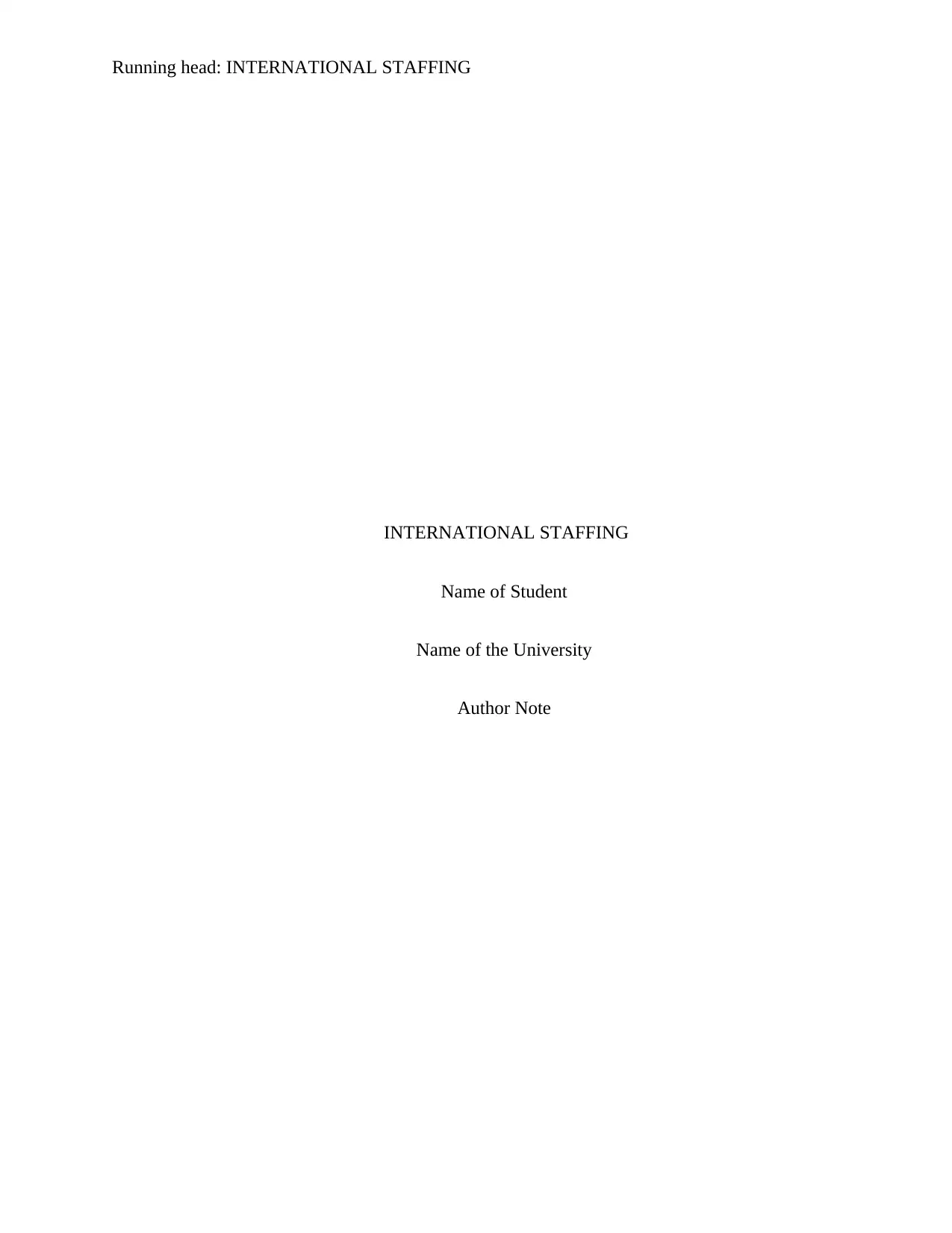
Running head: INTERNATIONAL STAFFING
INTERNATIONAL STAFFING
Name of Student
Name of the University
Author Note
INTERNATIONAL STAFFING
Name of Student
Name of the University
Author Note
Paraphrase This Document
Need a fresh take? Get an instant paraphrase of this document with our AI Paraphraser
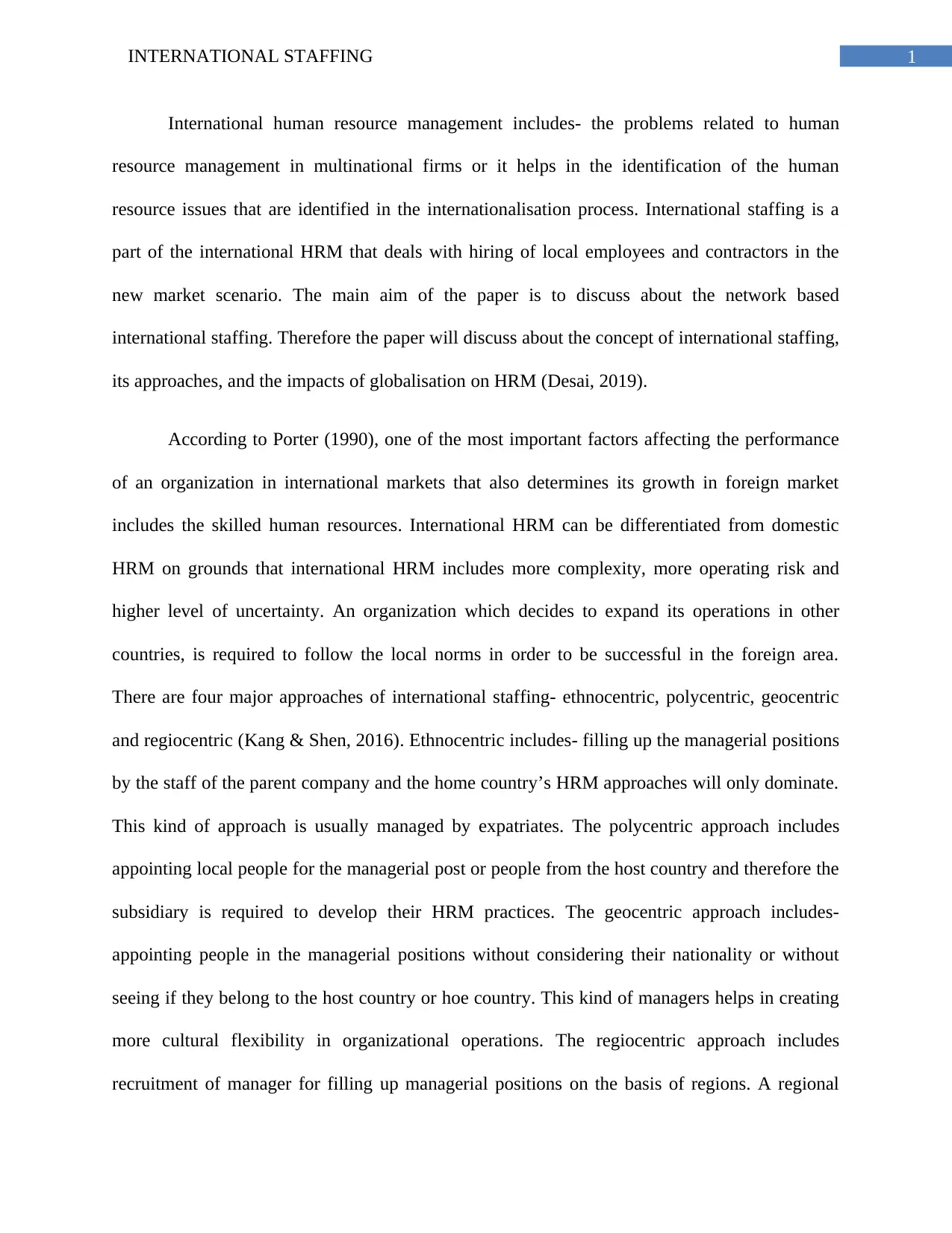
1INTERNATIONAL STAFFING
International human resource management includes- the problems related to human
resource management in multinational firms or it helps in the identification of the human
resource issues that are identified in the internationalisation process. International staffing is a
part of the international HRM that deals with hiring of local employees and contractors in the
new market scenario. The main aim of the paper is to discuss about the network based
international staffing. Therefore the paper will discuss about the concept of international staffing,
its approaches, and the impacts of globalisation on HRM (Desai, 2019).
According to Porter (1990), one of the most important factors affecting the performance
of an organization in international markets that also determines its growth in foreign market
includes the skilled human resources. International HRM can be differentiated from domestic
HRM on grounds that international HRM includes more complexity, more operating risk and
higher level of uncertainty. An organization which decides to expand its operations in other
countries, is required to follow the local norms in order to be successful in the foreign area.
There are four major approaches of international staffing- ethnocentric, polycentric, geocentric
and regiocentric (Kang & Shen, 2016). Ethnocentric includes- filling up the managerial positions
by the staff of the parent company and the home country’s HRM approaches will only dominate.
This kind of approach is usually managed by expatriates. The polycentric approach includes
appointing local people for the managerial post or people from the host country and therefore the
subsidiary is required to develop their HRM practices. The geocentric approach includes-
appointing people in the managerial positions without considering their nationality or without
seeing if they belong to the host country or hoe country. This kind of managers helps in creating
more cultural flexibility in organizational operations. The regiocentric approach includes
recruitment of manager for filling up managerial positions on the basis of regions. A regional
International human resource management includes- the problems related to human
resource management in multinational firms or it helps in the identification of the human
resource issues that are identified in the internationalisation process. International staffing is a
part of the international HRM that deals with hiring of local employees and contractors in the
new market scenario. The main aim of the paper is to discuss about the network based
international staffing. Therefore the paper will discuss about the concept of international staffing,
its approaches, and the impacts of globalisation on HRM (Desai, 2019).
According to Porter (1990), one of the most important factors affecting the performance
of an organization in international markets that also determines its growth in foreign market
includes the skilled human resources. International HRM can be differentiated from domestic
HRM on grounds that international HRM includes more complexity, more operating risk and
higher level of uncertainty. An organization which decides to expand its operations in other
countries, is required to follow the local norms in order to be successful in the foreign area.
There are four major approaches of international staffing- ethnocentric, polycentric, geocentric
and regiocentric (Kang & Shen, 2016). Ethnocentric includes- filling up the managerial positions
by the staff of the parent company and the home country’s HRM approaches will only dominate.
This kind of approach is usually managed by expatriates. The polycentric approach includes
appointing local people for the managerial post or people from the host country and therefore the
subsidiary is required to develop their HRM practices. The geocentric approach includes-
appointing people in the managerial positions without considering their nationality or without
seeing if they belong to the host country or hoe country. This kind of managers helps in creating
more cultural flexibility in organizational operations. The regiocentric approach includes
recruitment of manager for filling up managerial positions on the basis of regions. A regional
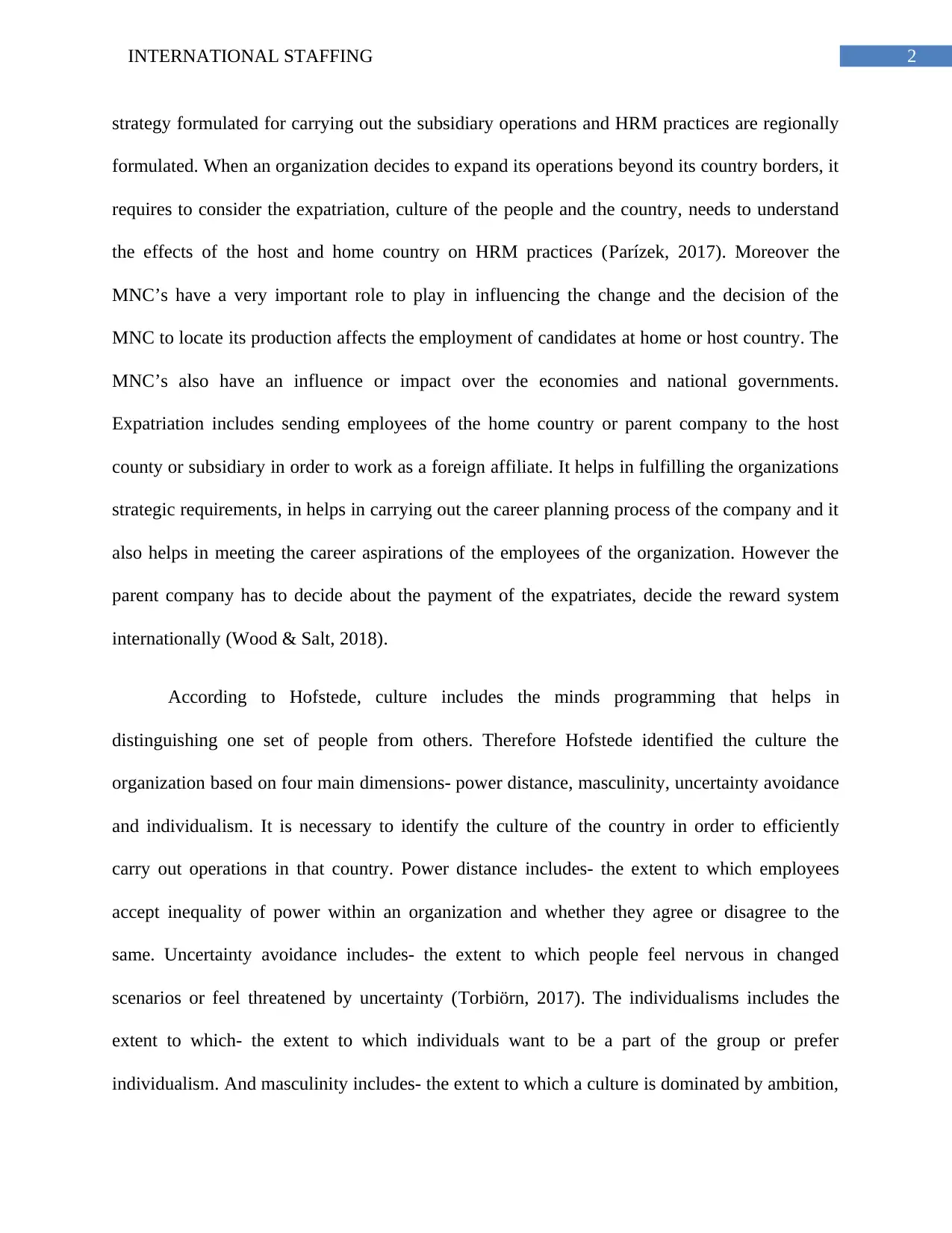
2INTERNATIONAL STAFFING
strategy formulated for carrying out the subsidiary operations and HRM practices are regionally
formulated. When an organization decides to expand its operations beyond its country borders, it
requires to consider the expatriation, culture of the people and the country, needs to understand
the effects of the host and home country on HRM practices (Parízek, 2017). Moreover the
MNC’s have a very important role to play in influencing the change and the decision of the
MNC to locate its production affects the employment of candidates at home or host country. The
MNC’s also have an influence or impact over the economies and national governments.
Expatriation includes sending employees of the home country or parent company to the host
county or subsidiary in order to work as a foreign affiliate. It helps in fulfilling the organizations
strategic requirements, in helps in carrying out the career planning process of the company and it
also helps in meeting the career aspirations of the employees of the organization. However the
parent company has to decide about the payment of the expatriates, decide the reward system
internationally (Wood & Salt, 2018).
According to Hofstede, culture includes the minds programming that helps in
distinguishing one set of people from others. Therefore Hofstede identified the culture the
organization based on four main dimensions- power distance, masculinity, uncertainty avoidance
and individualism. It is necessary to identify the culture of the country in order to efficiently
carry out operations in that country. Power distance includes- the extent to which employees
accept inequality of power within an organization and whether they agree or disagree to the
same. Uncertainty avoidance includes- the extent to which people feel nervous in changed
scenarios or feel threatened by uncertainty (Torbiörn, 2017). The individualisms includes the
extent to which- the extent to which individuals want to be a part of the group or prefer
individualism. And masculinity includes- the extent to which a culture is dominated by ambition,
strategy formulated for carrying out the subsidiary operations and HRM practices are regionally
formulated. When an organization decides to expand its operations beyond its country borders, it
requires to consider the expatriation, culture of the people and the country, needs to understand
the effects of the host and home country on HRM practices (Parízek, 2017). Moreover the
MNC’s have a very important role to play in influencing the change and the decision of the
MNC to locate its production affects the employment of candidates at home or host country. The
MNC’s also have an influence or impact over the economies and national governments.
Expatriation includes sending employees of the home country or parent company to the host
county or subsidiary in order to work as a foreign affiliate. It helps in fulfilling the organizations
strategic requirements, in helps in carrying out the career planning process of the company and it
also helps in meeting the career aspirations of the employees of the organization. However the
parent company has to decide about the payment of the expatriates, decide the reward system
internationally (Wood & Salt, 2018).
According to Hofstede, culture includes the minds programming that helps in
distinguishing one set of people from others. Therefore Hofstede identified the culture the
organization based on four main dimensions- power distance, masculinity, uncertainty avoidance
and individualism. It is necessary to identify the culture of the country in order to efficiently
carry out operations in that country. Power distance includes- the extent to which employees
accept inequality of power within an organization and whether they agree or disagree to the
same. Uncertainty avoidance includes- the extent to which people feel nervous in changed
scenarios or feel threatened by uncertainty (Torbiörn, 2017). The individualisms includes the
extent to which- the extent to which individuals want to be a part of the group or prefer
individualism. And masculinity includes- the extent to which a culture is dominated by ambition,
⊘ This is a preview!⊘
Do you want full access?
Subscribe today to unlock all pages.

Trusted by 1+ million students worldwide
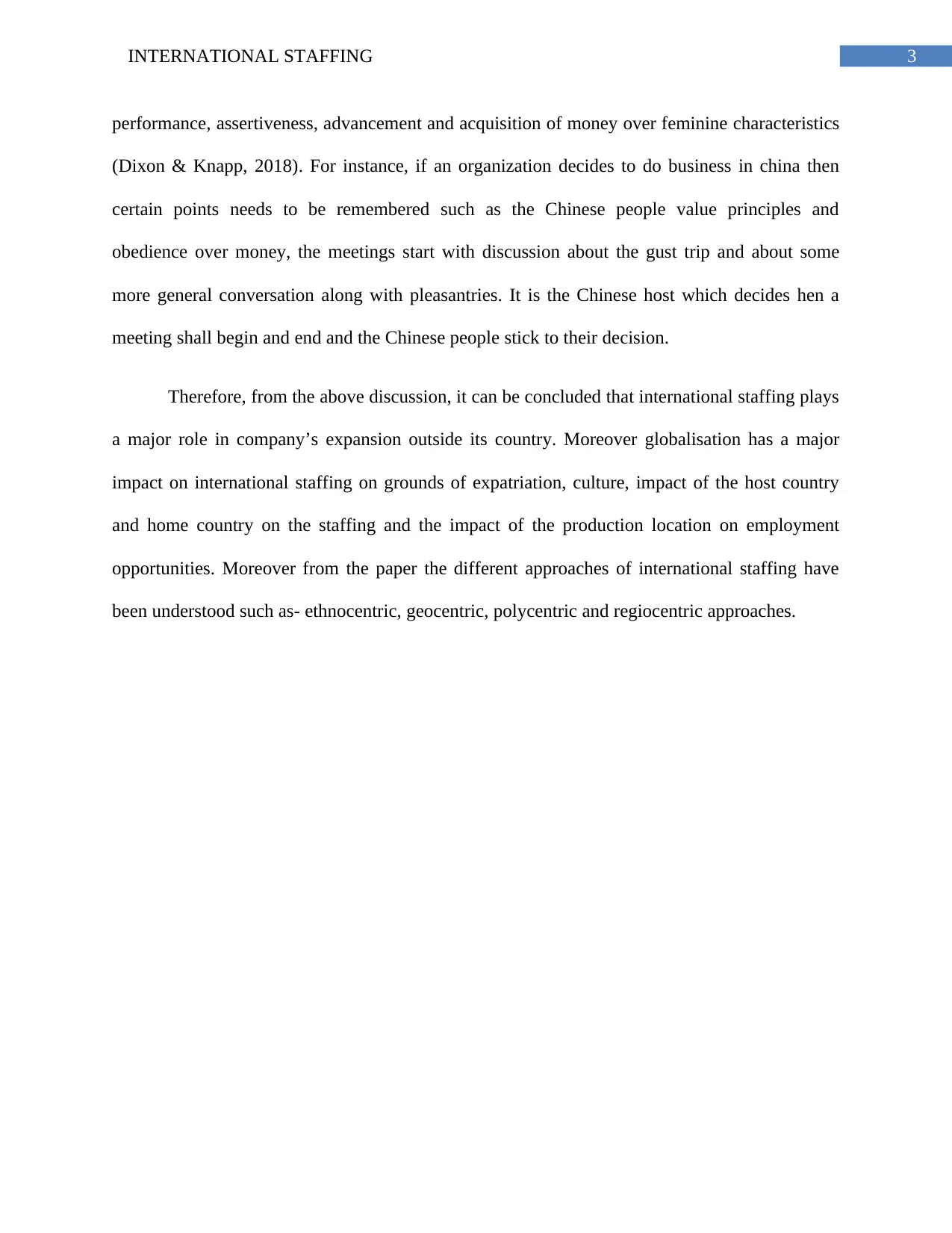
3INTERNATIONAL STAFFING
performance, assertiveness, advancement and acquisition of money over feminine characteristics
(Dixon & Knapp, 2018). For instance, if an organization decides to do business in china then
certain points needs to be remembered such as the Chinese people value principles and
obedience over money, the meetings start with discussion about the gust trip and about some
more general conversation along with pleasantries. It is the Chinese host which decides hen a
meeting shall begin and end and the Chinese people stick to their decision.
Therefore, from the above discussion, it can be concluded that international staffing plays
a major role in company’s expansion outside its country. Moreover globalisation has a major
impact on international staffing on grounds of expatriation, culture, impact of the host country
and home country on the staffing and the impact of the production location on employment
opportunities. Moreover from the paper the different approaches of international staffing have
been understood such as- ethnocentric, geocentric, polycentric and regiocentric approaches.
performance, assertiveness, advancement and acquisition of money over feminine characteristics
(Dixon & Knapp, 2018). For instance, if an organization decides to do business in china then
certain points needs to be remembered such as the Chinese people value principles and
obedience over money, the meetings start with discussion about the gust trip and about some
more general conversation along with pleasantries. It is the Chinese host which decides hen a
meeting shall begin and end and the Chinese people stick to their decision.
Therefore, from the above discussion, it can be concluded that international staffing plays
a major role in company’s expansion outside its country. Moreover globalisation has a major
impact on international staffing on grounds of expatriation, culture, impact of the host country
and home country on the staffing and the impact of the production location on employment
opportunities. Moreover from the paper the different approaches of international staffing have
been understood such as- ethnocentric, geocentric, polycentric and regiocentric approaches.
Paraphrase This Document
Need a fresh take? Get an instant paraphrase of this document with our AI Paraphraser
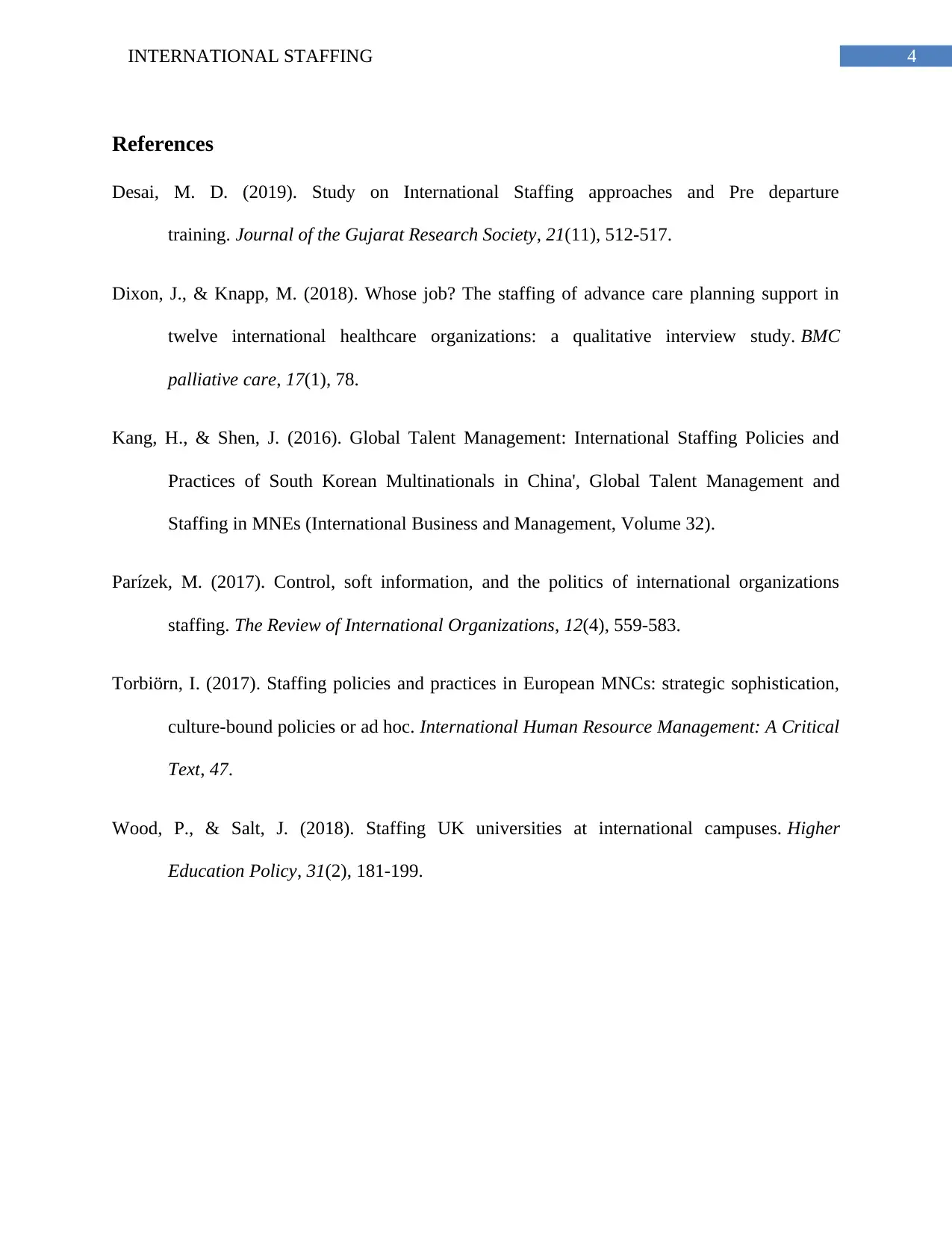
4INTERNATIONAL STAFFING
References
Desai, M. D. (2019). Study on International Staffing approaches and Pre departure
training. Journal of the Gujarat Research Society, 21(11), 512-517.
Dixon, J., & Knapp, M. (2018). Whose job? The staffing of advance care planning support in
twelve international healthcare organizations: a qualitative interview study. BMC
palliative care, 17(1), 78.
Kang, H., & Shen, J. (2016). Global Talent Management: International Staffing Policies and
Practices of South Korean Multinationals in China', Global Talent Management and
Staffing in MNEs (International Business and Management, Volume 32).
Parízek, M. (2017). Control, soft information, and the politics of international organizations
staffing. The Review of International Organizations, 12(4), 559-583.
Torbiörn, I. (2017). Staffing policies and practices in European MNCs: strategic sophistication,
culture-bound policies or ad hoc. International Human Resource Management: A Critical
Text, 47.
Wood, P., & Salt, J. (2018). Staffing UK universities at international campuses. Higher
Education Policy, 31(2), 181-199.
References
Desai, M. D. (2019). Study on International Staffing approaches and Pre departure
training. Journal of the Gujarat Research Society, 21(11), 512-517.
Dixon, J., & Knapp, M. (2018). Whose job? The staffing of advance care planning support in
twelve international healthcare organizations: a qualitative interview study. BMC
palliative care, 17(1), 78.
Kang, H., & Shen, J. (2016). Global Talent Management: International Staffing Policies and
Practices of South Korean Multinationals in China', Global Talent Management and
Staffing in MNEs (International Business and Management, Volume 32).
Parízek, M. (2017). Control, soft information, and the politics of international organizations
staffing. The Review of International Organizations, 12(4), 559-583.
Torbiörn, I. (2017). Staffing policies and practices in European MNCs: strategic sophistication,
culture-bound policies or ad hoc. International Human Resource Management: A Critical
Text, 47.
Wood, P., & Salt, J. (2018). Staffing UK universities at international campuses. Higher
Education Policy, 31(2), 181-199.
1 out of 5
Related Documents
Your All-in-One AI-Powered Toolkit for Academic Success.
+13062052269
info@desklib.com
Available 24*7 on WhatsApp / Email
![[object Object]](/_next/static/media/star-bottom.7253800d.svg)
Unlock your academic potential
Copyright © 2020–2026 A2Z Services. All Rights Reserved. Developed and managed by ZUCOL.




